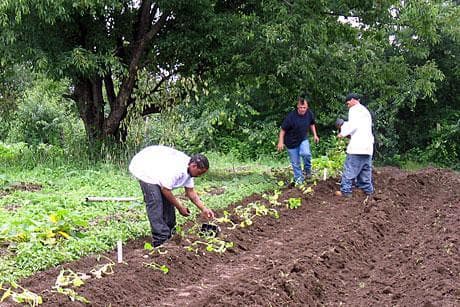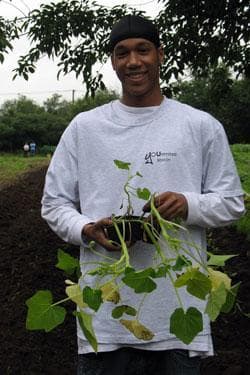Advertisement
Anti-Violence Programs Slashed In New Mass. Budget
Resume
What does organic farming have to do with gang violence prevention?
Seventeen-year-old DelRay is from Roxbury. Today he’s on an organic farm, planting squash. "I'm planting the plant in the hole with the fertilizer," he explains. "The fertilizer is giving the plant nutrients for the roots for it to grow."
Next to him, in the muddy field not far from downtown Boston, is 18-year-old Sam, who was in a gang and didn’t want to use his last name. They’re paid $8 an hour, and Sam says the program keeps him safe, "by, like, keeping me busy and keeping me focused so that I can keep my mind focused on what I am trying to do next. And with the money that I get, I’m trying to get my permit, get my license, get a car and move on."
Youth Options Unlimited Boston, which placed these kids at the farm and at other work sites, gets more than half it’s funding from a state program called the Shannon Grants. Deputy Director Kim Pelletreau says farming teaches kids to be reliable workers who follow directions.
"They get evaluated on a point system every day: Their attendance, their punctuality, their attitude, their commitment, their contribution. They're measured on everything," she says. "This experience — no matter what the project is — is about kids learning what it means to work."

The Shannon Grants were created in 2005 in response to escalating gang violence in the state. Last year, the legislature allotted $13 million to 18 cities for a two-pronged strategy. Some of the money goes to law enforcement to deter gangs. Most of it, though, funds youth agencies that are trying to persuade kids to leave gangs or not to join them in the first place. This year’s budget cuts the grant program in half, to $6.5 million.
"They often are the first programs that are cut out," says Lew Finfer, of the Massachusetts Community Action Network. Finfer understands the recession has led to less revenue for the state and cuts, but he thinks the Shannon Grants have been cut more than other programs.
"Very few state programs were cut 50 percent," Finfer says. "But I think the bigger problem is the lack of revenue. If we passed an income tax increase only equal to what we were paying during the last recession, it wouldn't restore all the cuts, but it would lessen them."
Finfer would like to see another tax increase because he fears public safety will suffer without more funding for the Shannon Grants. Some agencies that have relied on state money will try to make up for the loss by raising funds privately. Police departments may try to shift resources to cover the shortfall. But there will be reductions in police patrols, jobs for youth, outreach workers and programs.
That worries Kim Pelletreau of Youth Options. "The Shannon Grant in the city of Boston and the partners of Y.O.U. Boston that the Shannon Grants support are absolutely instrumental," Pelletreau says. "That money has been absolutely critical to being able to serve the highest-risk population in the city of Boston."
Police departments around the state that receive Shannon Grants are also lamenting the cut in funding. Lowell, which has seen a decrease in gang-related crime, received nearly $1 million in Shannon Grants last fiscal year. The Framingham Police Department uses the $150,000 it got to pay for an outreach worker for gangs and a resource officer in the high school, in an effort to solve problems on the street before they turn into 911 calls.
Deputy Police Chief Ken Ferguson says he thinks that has prevented crime. "We’re going to have to prioritize and determine, you know, what we're going to try to sustain and what we’re going to have to lose as a result of the cuts," he says.
Paying former gang members to plant organic crops might be hard to link to successfully decreasing crime. But DelRay says it keeps him from hanging out in his neighborhood and possibly getting into trouble. "It’s a good program, I don’t think they should be cutting 'cause it’s giving people like us a second chance, basically," he says. "I think they should be putting more money."
But the ongoing recession means state revenue continues to drop below expectations, so lawmakers are not ruling out more cuts to programs — such as the Shannon Grants — later this year.
This program aired on July 13, 2009.